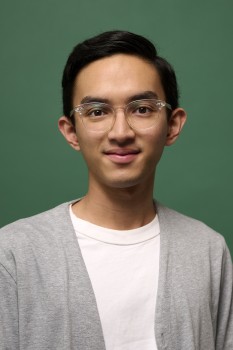
Developing the batteries of tomorrow together
The International Graduate School of Battery Chemistry, Characterization, Analysis, Recycling and Application (BACCARA) was established on 1 July 2020 at Münster University with the aim of setting standards in research and education. A comprehensive research programme covers the fields of materials science, (macro-)molecular chemistry, electrochemistry, catalysis and battery cell research for energy storage as well as life cycle analysis and recycling. In their guest contributions, two BACCARA doctoral students present the importance that interdisciplinarity and networking have in their everyday research.
What do you, as a food chemist, do with batteries? Obviously, you mustn’t eat them …

Electrochemistry is, admittedly, not exactly a speciality of food chemists – which is why I found the introductory lecture to the subject organised by BACCARA in my first PhD semester enormously rewarding. Starting from scratch may not have been necessary for many of the other PhD students at the Graduate School, but it was a great help for me to get an idea of (lithium-ion) batteries and the state of current research. What contributes even more to direct collaboration is the monthly colloquium, where PhD students from the Graduate School present their current research to one another – and that always throws up new questions or leads to new collaborations.
In everyday work in the lab, discussions with researchers from other working groups doesn’t actually account for much time because – for me, anyway – the questions I have relate to methodology and food chemists or toxicologists are better equipped to help me there. But all my samples come from other PhD students as I don’t have any possibility to make batteries myself. This is why interdisciplinary collaboration is essential for my PhD. Other people, for example, can assess far better than I can which starting materials are degraded in which processes. But I what I can find out is whether for example a fresh electrolyte or a used one is more mutagenic – and it’s also very interesting for my collaboration partners to get toxicological data on their electrolytes. In this way, both sides benefit from interdisciplinary collaboration.
Elisabeth Muschiol works in the group of Prof. Dr. Melanie Esselen, Institute of Food Chemistry of University of Münster.
Interdisciplinarity is the DNA of the BACCARA Research School

BACCARA is specially designed for students to collaborate. We have a monthly colloquium where students take turns to present their work, both the successful and the unsuccessful ones. Discovering the diverse research focus of other students allowed me to be exposed to fields that I would not discover on my own. From this colloquium, I can see whose expertise can augment my work and vice versa. Combined with the structure of BACCARA fellowships, which does not require students to work on a predetermined project, students are generally more open to taking on extra work associated with the collaboration. With these approaches, students can pursue topics they see fit and venture outside the expertise of their research group to do collaborative work.
Although initially, the degree of freedom given by BACCARA for students to choose their research focus can be overwhelming, once a student manages to build expertise in a niche topic, there seems to be an endless possibility for collaboration. In my case, I had the opportunity to combine an advanced analytical technique and novel high-concentration electrolyte formulations for my material, though the results were not impressive. Nevertheless, in science, one must keep moving forward and I am currently collaborating on a novel electrolyte additive and particle coating method to extend the lifetime of the material I am developing. Overall, I spend 70 percent of my time doing my own project and 30 percent doing collaborative work. This balance allows me to always feel excited about potential breakthroughs and expand my expertise at the same time. I believe this collaborative framework of BACCARA would allow graduates to become leaders in their careers considering that battery chemistry is a complex multidisciplinary field.
Anindityo Arifiadi works in the group of Prof. Martin Winter, MEET Battery Research Center.
